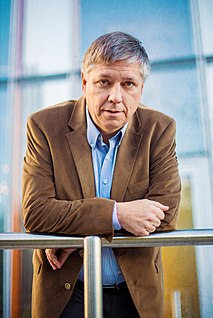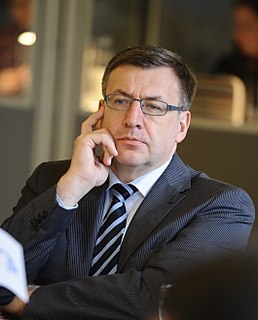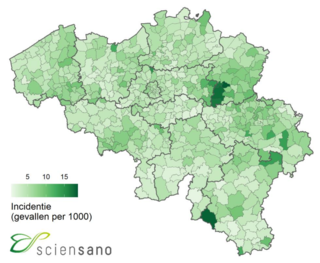
Flanders is the Dutch-speaking northern portion of Belgium and one of the communities, regions and language areas of Belgium. However, there are several overlapping definitions, including ones related to culture, language, politics, and history, and sometimes involving neighbouring countries. The demonym associated with Flanders is Fleming, while the corresponding adjective is Flemish. The official capital of Flanders is the City of Brussels, although the Brussels-Capital Region has an independent regional government. The government of Flanders only oversees the community aspects of Flanders life in Brussels, such as Flemish culture and education.

Belgium is a federal state comprising three communities and three regions that are based on four language areas. For each of these subdivision types, the subdivisions together make up the entire country; in other words, the types overlap.

The Kingdom of Belgium is divided into three regions. Two of these regions, Flanders and Wallonia, are each subdivided into five provinces. The third region, Brussels, is not divided into provinces, as it was originally only a small part of a province itself.

Christian Democratic and Flemish is a Flemish Christian-democratic political party in Belgium. The party has historical ties to both trade unionism (ACV) and trade associations (UNIZO) and the Farmer's League. Until 2001, the party was named the Christian People's Party.

The Flemish Parliament constitutes the legislative power in Flanders for matters which fall within the competence of Flanders, both as a geographic region and as a cultural community of Belgium.

Yves Camille Désiré Leterme is a Belgian politician, a leader of the Christian Democratic and Flemish party (CD&V). He was the Prime Minister of Belgium, from November 2009 to December 2011.

The Flemish Community is one of the three institutional communities of Belgium, established by the Belgian constitution and having legal responsibilities only within the precise geographical boundaries of the Dutch-language area and of the bilingual area of Brussels-Capital. Unlike in the French Community of Belgium, the competences of the Flemish Community have been unified with those of the Flemish Region and are exercised by one directly elected Flemish Parliament based in Brussels.

The Flemish Government is the executive branch of the Flemish Community and the Flemish Region of Belgium. It consists of a government cabinet, headed by the Minister-President and accountable to the Flemish Parliament, and the public administration divided into 13 policy areas, each with an executive department and multiple agencies.

Johan Maria Gerardus Vandeurzen is a Belgian politician, member of Christen-Democratisch en Vlaams (CD&V), a centrist Flemish Christian Democratic party.

State reform, in the context of Belgium, is the ongoing process of seeking and finding constitutional and legal solutions to the problems and tensions in the different segments of the Belgian population, mostly between the Dutch-speakers of Flanders and the French-speakers of Wallonia. In general, Belgium has evolved from a unitary state to a federal state with communities, regions, and language areas.

Steven Vanackere, is a Belgian politician from Flanders and member of the Christian Democratic and Flemish party (CD&V). He held the portfolios of Deputy Prime Minister of Belgium and Minister of Foreign Affairs and Institutional Reform in the Leterme II government. He is the son of Leo Vanackere, who, following a political career as a Member of the Chamber of Representatives and the Senate of Belgium, became the Provincial Governor of West Flanders in 1979. His grandfather, Remi Wallays, had also been a senator and had been a former Mayor of Wevelgem.

Jan Jambon is a Belgian politician of the New Flemish Alliance (N-VA) who has been serving as Minister-President of Flanders since 2019. He replaced Kris Peeters as a member of the Belgian Chamber of Representatives in 2007. The N-VA was, at that time, partnered with the Christian-Democratic and Flemish party. In June 2010 and May 2014 he was re-elected on an N-VA list.

The Ministry of Gender Equality and Family, or formerly the Ministry of Gender Equality, is a cabinet-level division of the government of South Korea. It was created on February 28, 1998 as the Presidential Commission on Women's Affairs. The current Ministry was formed on January 29, 2001.

The 2019 Belgian regional elections took place on Sunday 26 May, the same day as the 2019 European Parliament election as well as the Belgian federal election.
The Flemish Care Inspectorate is a part of the Department of Welfare, Public Health and Family of the Flemish Government. The Flemish Government is the executive branch of the Flemish Community of Belgium. In Belgium, the Communities are responsible for the inspection of health and welfare services and establishments. The Care Inspectorate consists of two complementary divisions of the department: one for the inspection of services for disabled people and child care services, and one for the inspection of welfare services, health services and financial matters. Together, they inspect all services and establishments in these domains that are recognised, licensed or subsidised by the department or any agency associated with it. The Care Inspectorate also inspects disabled people who receive a so-called personal assistance budget or financial compensation for assistive tools.
The Department of Welfare, Public Health and Family is a department of the Flemish Government. The Flemish Government is the executive branch of the Flemish Community of Belgium. The department is a part of the so-called Welfare, Public Health and Family policy area, which consists of the department and a few associated agencies. The minister responsible for the department is the minister of Welfare, Public Health and Family of the Flemish Government. The current minister in the Bourgeois Government, which assumed office in 2014, is Jo Vandeurzen of the Christian Democratic and Flemish party. The department itself is led by a secretary-general. The department consists of nine divisions, of which the services of the secretary-general form one. Two of those divisions also form the Care Inspectorate, which inspects all health and welfare services and establishments that are recognised, licensed or subsidised by the department or any agency associated with it.
The Child and Family Agency is an agency of the Flemish Government. The Flemish Government is the executive branch of the Flemish Community of Belgium. In Belgium, the Communities are responsible for the provision of child and family services. The Child and Family Agency has three main tasks: the regulation and subsidising of child care services, the provision of preventive family support services and guidance to parents and children in cases of adoption. The agency also recognises and subsidises so-called confidential centres on child abuse, which offer voluntary assistance in cases of child abuse or child neglect. For the inspection of child care services, the agency relies on the Flemish Care Inspectorate.
The Agency for Care and Health is an agency of the Flemish Government. The Flemish Government is the executive branch of the Flemish Community of Belgium. In Belgium, the Communities are responsible for certain aspects of social care, health care and public health policy. The Agency for Care and Health is responsible for the recognition, licensing and subsidising of various providers and services for health care, elderly care, home care, residential care, and other forms of care, for facilitating the cooperation and data sharing between these services, for the organisation of preventive health services such as vaccinations and screening programs, for the control of infectious diseases, for environmental health monitoring, and for the organisation of the Flemish social protection programs. The Agency for Care and Health relies on the Flemish Care Inspectorate for the inspection of any of the services it is responsible for.

The COVID-19 pandemic in Belgium has resulted in 4,164,698 confirmed cases of COVID-19 and 31,799 deaths.













